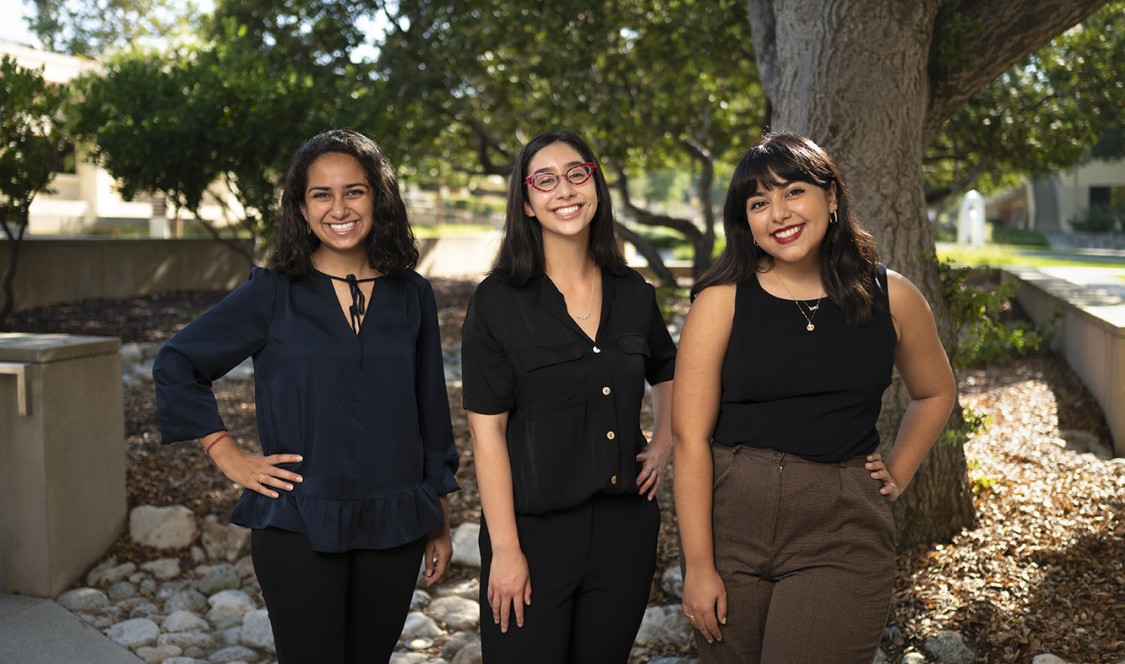Meet this year's new Ath Fellows
An evening at the Marian Miner Cook Athenaeum represents the epitome of the thriving intellectual life at CMC. And this year’s speakers program promises to deliver an illustrious roster of thought leaders and innovators, with deep knowledge and expertise in areas ranging from public health and service, to domestic and global political analysis, as well as the transformative impact of the arts.
In addition to the Ath’s in-person return, 2021-22 programming is especially enriched by the treasured venue’s central role in CMC’s 75th Anniversary celebration. This academic year, the Ath will host a yearlong curated series of special 75th Anniversary Distinguished Speakers focused on three themes: Civilization and Commerce, Unity and Division, and Science and Policy.
The Ath’s prestigious fall lineup debuts on Sept. 13 with 75th Anniversary speaker Atul Gawande, M.D., M.P.H, practicing surgeon, writer, and public health leader. Gawande’s topic is “On Breakthrough vs. Follow-Through Innovation” and will highlight the Science and Policy theme.
Read more
75th Distinguished Speaker series at the Ath
Fall 2021
Mon. Sept. 13
On Breakthrough vs. Follow-Through Innovation
Atul Gawande
Atul Gawande, M.D., M.P.H, practicing surgeon, writer, and public health leader, will discuss solutions he believes will save lives and reduce suffering.
Mon. Sept. 27
Notes From The Field: The Pipeline Project
Anna Deavere Smith
Theater artist Anna Deavere Smith explores current events from multiple points of view and combines journalistic technique with artistic interpretation.
Thu, Oct. 7
Progress and Enlightenment in the 21st Century
Steven Pinker
Steven Pinker, award- winning experimental psychologist and Johnstone Family Professor of Psychology at Harvard University, will offer ways to think about the challenges ahead.
Thu, Oct. 28
When Should Law Forgive?
Martha Minow
Martha Minow, 300th Anniversary University Professor at Harvard University and former dean of Harvard Law School, explores the promise and limitations of forgiveness.
Thu, Nov. 4
Science and Policy (Title TBA)
Dr. France A. Córdova
Dr. France A. Córdova, former director of the National Science Foundation, is an experienced leader in science, engineering, and education with more than three decades experience at universities and national labs.
Students, faculty, and staff please register for events here.
Alumni, families, and friends please click here for event information.
“Speakers in the anniversary series demonstrate intellectual leadership, professional distinction, originality of perspective and voice, and thoughtful engagement of issues from varied perspectives and views,” said Priya Junnar, director of the Athenaeum. “Equally importantly, the 75th Anniversary Distinguished Speakers personify a commitment to responsible leadership in their area of expertise.”
And, much to the joy of the CMC community, receptions, dinners, and presentations will be held on campus at the Ath, adhering to all of the College’s health and safety protocols. For the time being, Ath receptions will be held outdoors; meals will be served outdoors; and during the indoor presentation, all guests must be masked.
As is custom at the student-led Ath, events will be hosted by a trio of Woolley Ath Fellows—Maya Ghosh ’22, Maria Gutierrez-Vera ’22, and Maya Kurkhill ’23—who will introduce guests and help moderate the Q&A that follows each talk.
Junnar is excited for how this year’s fellows will “bring intellectual depth, commitment to viewpoint diversity, and demonstrated passion for the values of the Athenaeum. I am so impressed with their thoughtful approach and innovative ideas on how to navigate the current circumstances. I am confident that they will steward a wonderful and exciting year at the Athenaeum.”
Ghosh, who is from Dallas is pursuing a dual major in Philosophy, Politics, and Economics and Economics-Accounting. She is a project manager at the Rose Institute, and also works for the Roberts Environmental Center, Mock Trial, and The Forum.
Gutierrez-Vera is from nearby Whittier, Calif. She is studying Public Policy and American Studies. Gutierrez-Vera has worked with the Rose Institute on their Redistricting team and Video Voter series. She is also involved with Mellon Mays Undergraduate Fellowship and works at the Center for Writing and Public Discourse.
Kurkhill is a native Southern Californian and a Government major. As a research assistant with the Rose Institute, she worked on the Inland Empire Outlook and the Miller-Rose Initiative Database. She is also a fellow with the Debate Union.
We spoke to Ghosh, Gutierrez-Vera, and Kurkhill to learn their perspectives on this year’s Ath programming, as well as what they think makes an ideal speaker.
Why were you interested in becoming an Ath Fellow?
Maya Ghosh ’22: I was interested in becoming an Ath Fellow to support one of the most important places of discourse on our campus. It is a space to be heard, be challenged, and open yourself up to different ideas and beliefs. Over the past three years, the Ath has been fundamental to my personal and academic growth, and I look forward to ensuring that the Ath retains its open, honest, and inviting characteristics. I also was interested in becoming an Ath Fellow to serve as a representative and advocate for the Athenaeum amongst the CMC community. As we welcome two new classes to campus, I am excited to be sharing the beauty of Ath dinners, speeches, and conversations.
Maria Gutierrez-Vera ’22: I was interested in becoming an Ath Fellow because of how central the Ath has been to my CMC experience. Since freshman year, the Ath has been a safe space to explore my intellectual interests and embrace my curiosity without worry about class performance or whether I knew enough about the subject at hand. As I approach the end of my time here at CMC, I am grateful to have had such a welcoming environment where I got to come of age and mature into my diverse academic interests.
Maya Kurkhill ’23: In my first-year at the Claremont Colleges, the Ath was an academic refuge for me. The Ath is a place where, even in the most difficult points of the semester, I can be rejuvenated and even more curious about the world. I was interested in becoming an Ath Fellow to continue to have that sense of wonder, while also being challenged through discourse and discussion.
How do you approach assembling a diverse roster of speakers?
Ghosh: When assembling a roster of Ath speakers, I have tried to pay attention to creating a well-rounded, diverse roster of individuals who reflect not only a breadth of experiences, but who also are experts in a range of subjects. It is important to me that the Ath roster maintains its diversity to ensure that our community is able to learn from people of diverse backgrounds, not just ones which reflect their own experience and interests. The Ath is a place to consider all perspectives and learn from one another, and not only from speakers but also fellow audience members. Diversity is key to growth within our community, and the Ath is the perfect place to turn words into action.
Gutierrez-Vera: I think that each season's speakers should speak to the events of their time, and bring in some new perspectives through which we can gain a new understanding. I think that this season's speakers are responding to timely topics and debates happening both around campus and around the world.
What characteristics make an ideal speaker at the Ath?
Ghosh: Passion is the hallmark of an ideal Ath speaker. When a speaker is truly passionate about their work, research, or subject matter, their excitement for conversing with the crowd becomes contagious. I have seen audience members who are initially disinterested with an Ath speaker leave the talk with a newfound passion for ecology, criminal justice, and politics, just to name a few subject areas. We are very lucky to frequently have Ath speakers who are passionate about their work and are excited to be sharing their findings. Also, a touch of humor never hurts an Ath talk.
Kurkhill: Characteristics that make an ideal speaker include passion for engaging with our community, thinking, and dedication to the subject at hand.
As someone who has participated in debate programming at CMC’s Debate Union for many years, I found much of my learning has been through rigorous and thoughtful discussion. At the Athenaeum, we are honored to have that opportunity with the speaker.
Who are some of your favorite speakers at the Ath and why?
Ghosh: I remember putting on my shoes and walking out of my dorm room at 5:45 p.m., excited to see attorney Rabia Chaudry speak about the first season of Serial, bias in the criminal justice system, and whether Adnan Syed was innocent. Every moment in Rabia’s Ath talk was memorable. From walking into the Athenaeum and hearing whispers about whether people believed Adnan to be guilty or innocent, to dinnertime conversations about how the police and court system had not done their due diligence, I was deeply engaged with my fellow Ath-goers. Our shared anticipation to hear Rabia speak built throughout the evening. At 7 p.m. Rabia began a strong, highly personal narrative about her relationship with Adnan, his family, and how their community was affected by his criminal charges. Although moments during dinner and talk were noteworthy, this overall experience was personally powerful for another reason: the Athenaeum had challenged my beliefs and pushed me to question what I believed to be true.
Speakers such as Rabia Chaudry, economist Raj Chetty, and writer Joyce Carol Oates (amongst so many others) challenged my understanding of the world and pushed me to think critically about the systems, stories, and institutions that dictate our lives. To me, this is the true beauty of the Athenaeum.
Gutierrez-Vera: Hands down, my favorite Ath speaker is novelist Viet Thanh Nguyen, who shared his thoughts on immigration, love, identity, and the American dream. Nguyen's talk instilled a lot of confidence in the validity of my own academic dreams and aspirations. Some of my other favorite speakers have been Nikole Hannah-Jones, Pulitzer Prize-winning investigative journalist and lead creator of The 1619 Project, as well as Anthony Abraham Jack, author of "The Privileged Poor: How Elite Colleges Are Failing Disadvantaged Students." Both individuals spoke on intersections of race, privilege, and education, all topics I am passionate about.
Kurkhill: One of my favorite speakers at the Athenaeum was Graham Lee Brewer, a national reporter for NBC News and the former Indigenous Affairs editor for KOSU, presenting on “How American Journalism Created and Sustained National Myths.” Brewer spoke about the dynamics of journalism produced by indigenous and non-indigenous reporters. Although the focus of the talk was on journalism, the lessons I learned about the importance of indigenous agency and non-exploitative methods transcend to academia and legislation.
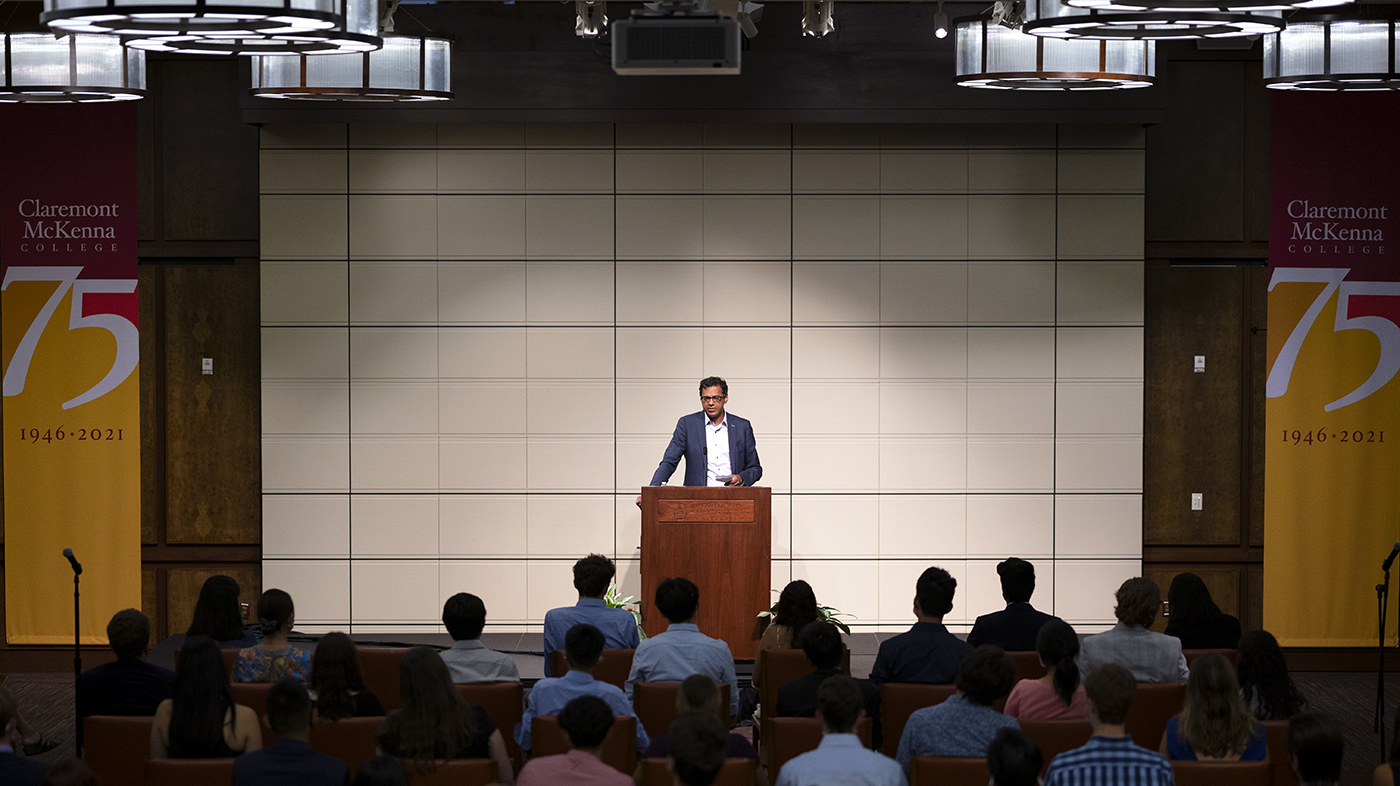
A triumphant return to the in-person Athenaeum
“Welcome to the Marian Miner Cook Athenaeum and the first in-person event in a year and a half.”
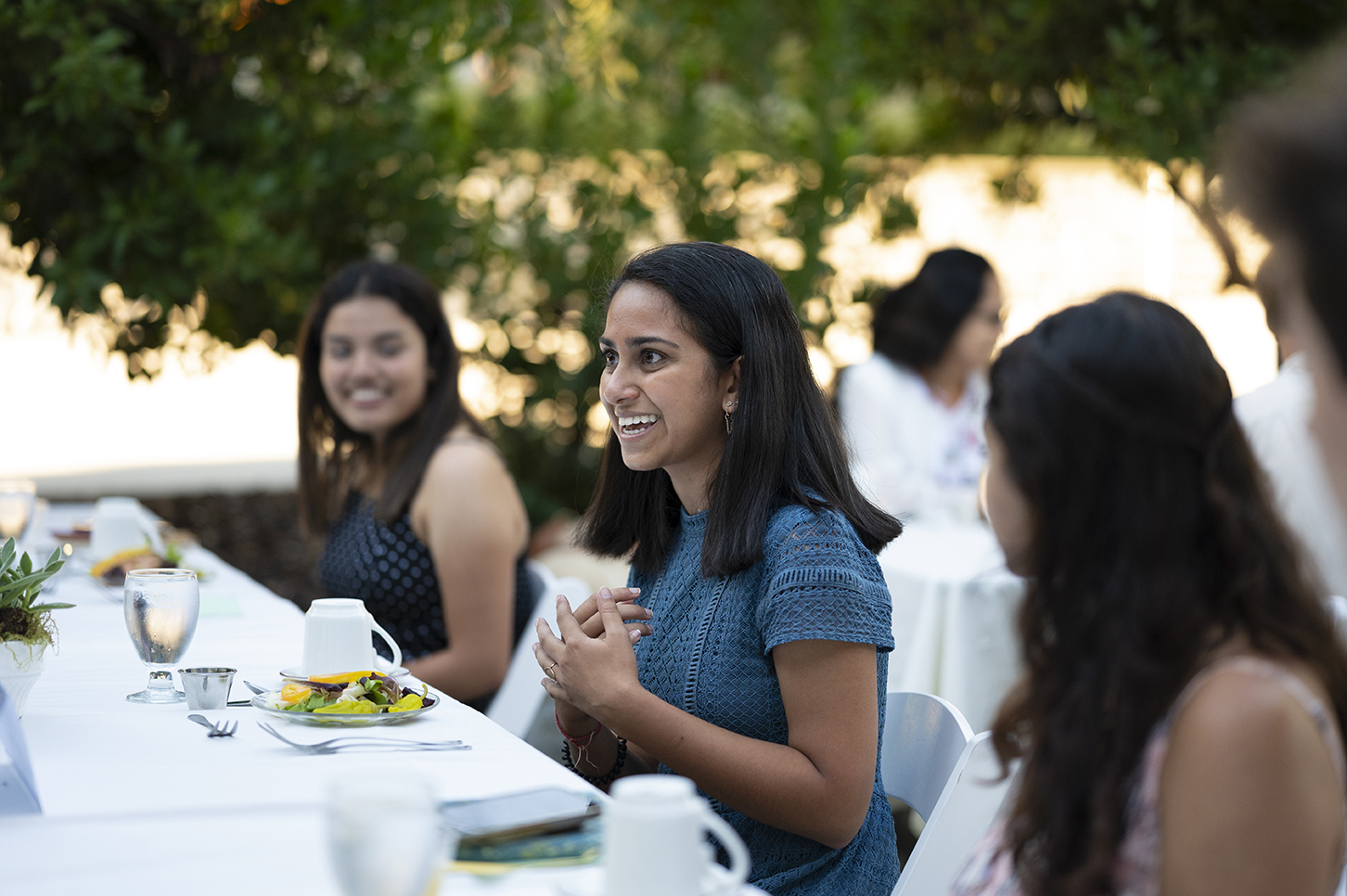
Maya Ghosh ’22 may not have intended her podium introduction as a new Athenaeum fellow to be a raucous applause line. But there was something cathartic about the spontaneous reaction that animated the early moments of Dr. Atul Gawande’s opening night talk.
The same special energy greeted guests as they arrived for the 5:30 p.m. outdoor reception, wide smiles carrying through a bustling dinner service at two adjoining Ath patios. Students dressed for an evening out. Conversations between friends and strangers. Ath director Priya Junnar warmly making the rounds. CMC’s John Faranda ’79 explaining the rules of coffee and tea service to newcomers. All the familiar hallmarks were evident.
Welcome back to the Ath, CMC.
Read more“When I applied here, the Athenaeum was one of the first things that I heard about. So, I felt really motivated to be here for not only my first time, but the first one back,” said Adrian Flynn ’25, who attended with fellow first-year Wally Bargeron ’25. “Honestly, it feels so special to be here, to finally be seeing what this Athenaeum thing is all about.”
Both Flynn and Bargeron got their books signed by Gawande after his talk and were a little awestruck by the practicing surgeon, public health researcher, and best-selling author—the first in an all-star lineup of 75th Anniversary Distinguished Speakers visiting the Ath this year. His presentation highlighted the core CMC anniversary theme of Science and Policy.
“He’s definitely a household name where I’m from,’ Bargeron said of Gawande, an endocrine surgeon at Brigham and Women’s Hospital in Boston and a professor at Harvard Medical School. “It’s amazing for him to be the first person I get to say I saw at the Ath.”
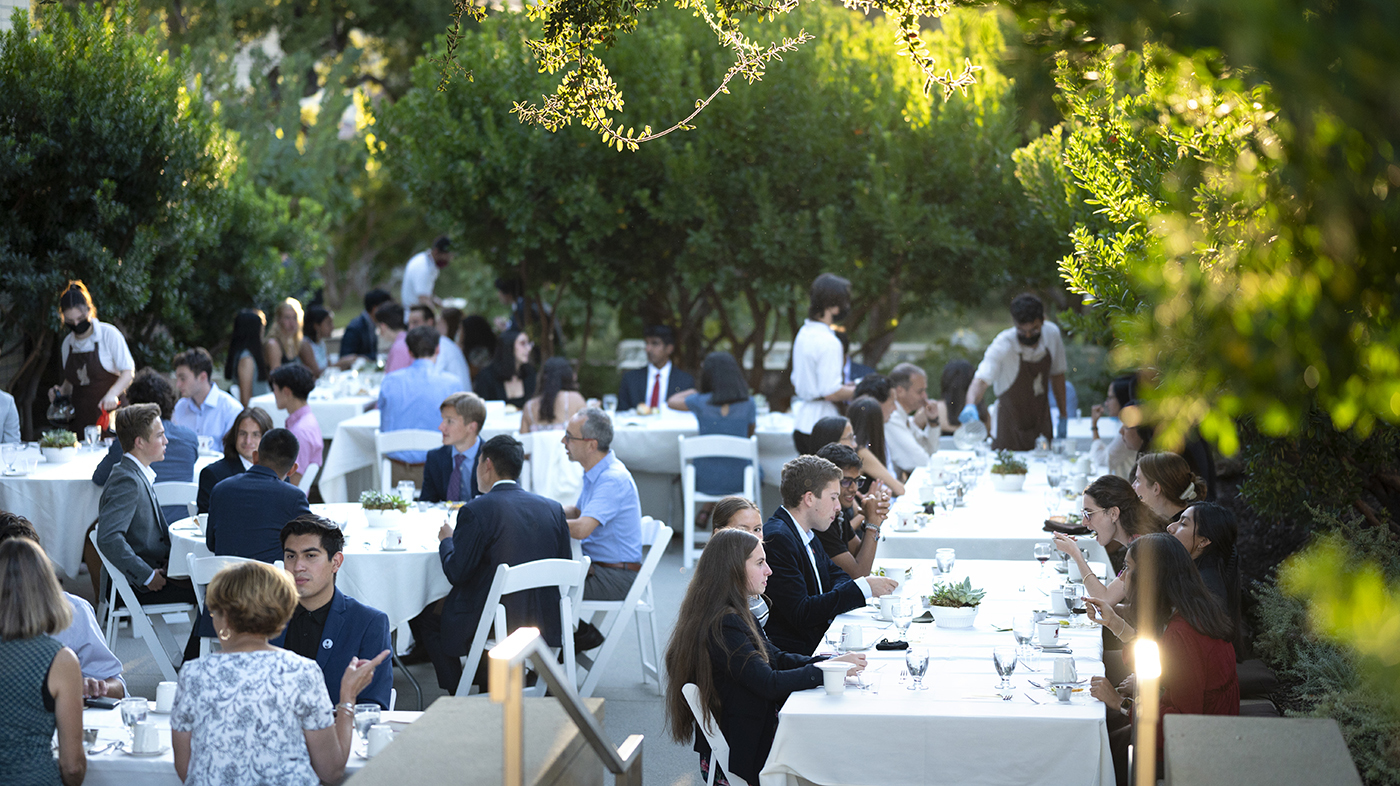
Similarly, Jasmin Joshi ’23 said she couldn’t have asked for a better re-introduction to Ath life than Gawande, whose book, “Being Mortal,” mirrored her own independent study on end-of-life issues as a sophomore. A neuroscience major who wants to become a physician, Joshi said Gawande fully embodies CMC values of open discourse and interdisciplinary liberal arts learning.
“What I love about the Ath is that you can come and hear what might seem like a niche topic, but they choose the kind of speakers who will apply their expertise to anything you want to do and learn more about,” Joshi said. “That not only helps me get excited about my future, but it feels fully reflective of where CMC students are at. We’re all about connecting our learning between science, politics, policy, economics, and innovation. And we love to talk about it.”
As for the showstopper of the evening, Gawande spoke about the need to go beyond breakthrough innovation and push further with follow-through innovation to solve complex problems in the world. He began by explaining how most problems are caused by ignorance (a limited understanding; what we don’t know) or ineptitude (a failure to execute on what we do know)—and how the pendulum may be swinging more toward the latter.
Driven by wanting to solve problems in medicine, especially those stemming from human error, Gawande devised a multi-point safe surgery checklist (covered in his book, “The Checklist Manifesto”) to be used in operating rooms around the world. Something as simple as making introductions as a team before surgery, he stated, could have a significant impact on fostering communication and cooperation at a hospital, thereby reducing errors.
“The biggest challenges, the biggest problems, the biggest reasons we have failures are not because we didn’t discover answers, but because we couldn’t execute,” Gawande said, later calling for less of a culture of lone cowboys and one with “more pit crews” working together toward a common goal.
Gawande also shared how applying strong leadership and accountability to all systems—whether to find solutions for education, climate change, the economy, or the current COVID-19 pandemic—often leads to more humility, discipline, and teamwork. It can also be the difference between solving “tame problems and wicked problems.”
A tame problem, he said, is how to build a bridge; the wicked problem, where to put it. While the wicked set of problems—with its inequities, trade-offs, and unanticipated complications—often leads to “messy work,” the resolve required of follow-through innovation can truly transform the world.
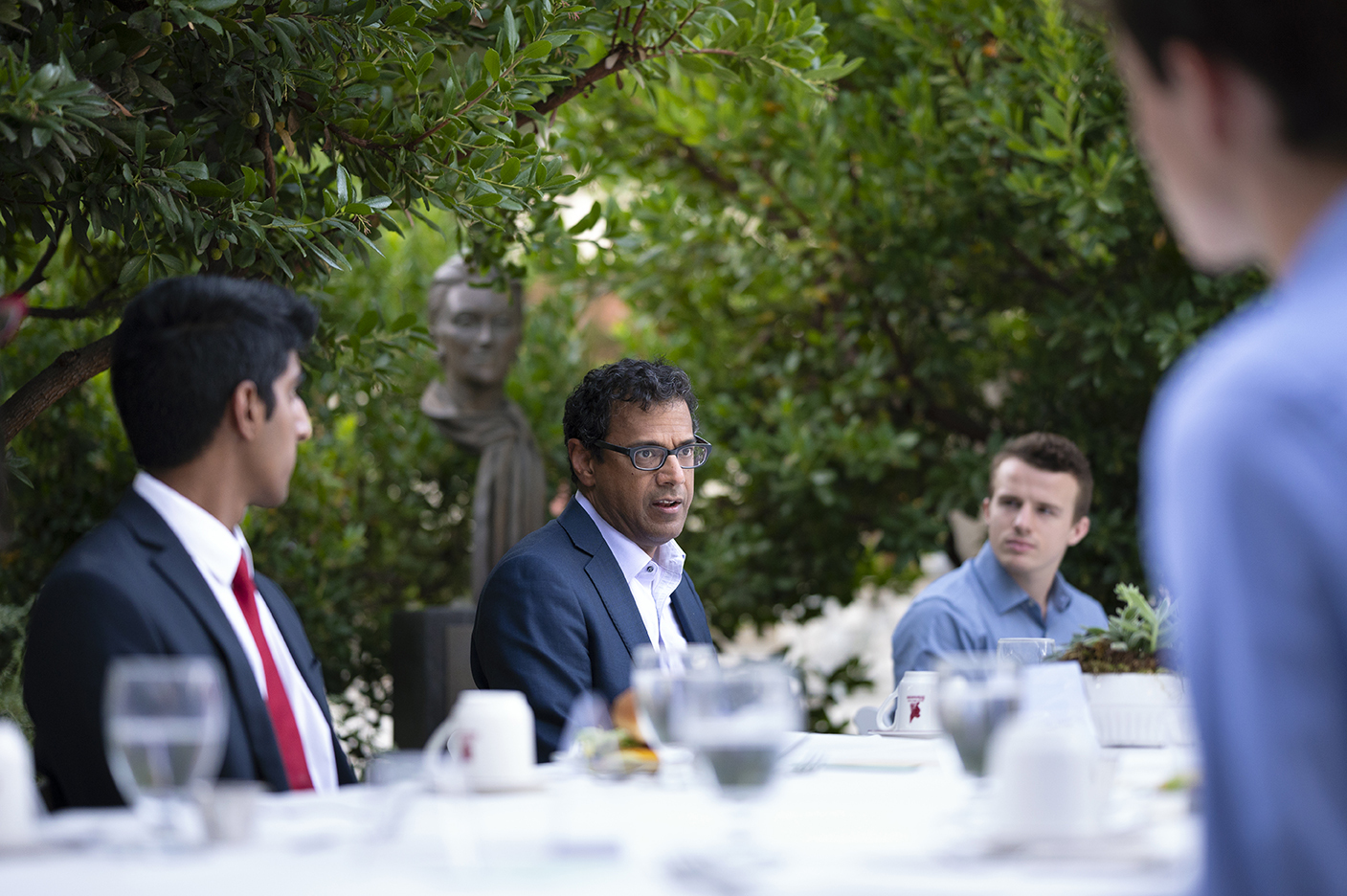
“Work on the problem of failures of execution, work on follow-through innovation, is always work on a wicked problem. Those problems will be amenable to systematic solutions. You will also have to engage in advocating for the values you want for those systems to serve,” Gawande said.
“That’s why I’m so grateful to be here at CMC, talking to you. You put value in scientific innovation and technical know-how. You also understand that you cannot achieve impact without innovation and how it fits into the world.”
Learn more about this year’s 75th Anniversary Distinguished Speaker Series and view the semester’s full Athenaeum schedule.
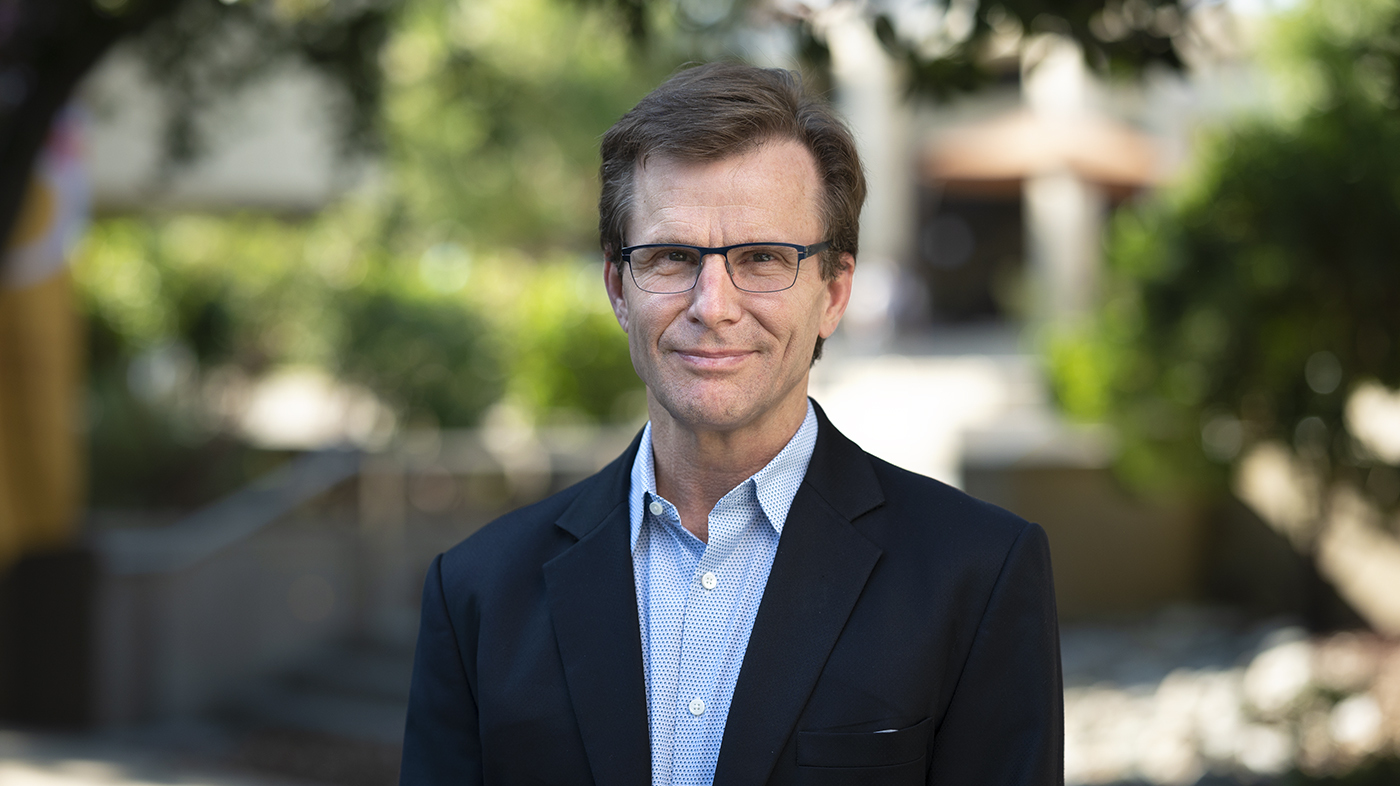
Dr. Daniel Kelly ’82 talks psychedelics, neuroscience at the Ath
Microdosing. Mystical experiences. Magic mushrooms.
These are not the typical topics one would expect a brain surgeon to explore, yet they were the basis for Dr. Daniel Kelly’s talk, “Past, Present & Future of Psychedelic-Assisted Therapy: A New Dawn for Mental Health and Neuroscience” at the Marian Miner Cook Athenaeum on Sept. 16.
As he began, Kelly ’82 seemingly read the minds of many in the audience, when he asked, “Why would a neurosurgeon get into this line of work?”
His answer: “Because I think that this is going to be a game changer,” predicting that the “psychedelic renaissance” will “transform the neurosciences and behavioral healthcare.”
Read moreA biology and chemistry major at CMC, Kelly is director and founder of the Pacific Neuroscience Institute at St. John’s Providence, which is focused on cognitive, memory and mood disorders. Internationally recognized for his work advancing techniques of minimally invasive “keyhole” and endoscopic brain tumor surgery, he also plays a major role in expanding clinical services and research avenues at the Pacific Brain Health Center and the Treatment & Research in Psychedelics (TRIP) program.
In his talk, Kelly offered an overview of his work with the Brain Health Center and TRIP, which is dedicated to the appropriate medical use of psychedelic-assisted therapy. “Our initial focus was on dementia and memory issues,” he said. “And then more recently we’ve been focused on what we would call mood disorders, depression, anxiety, addiction—and this is where the TRIP program came into being.”
Kelly further explained that while his “day job” is brain surgery, his work with the Pacific Neuroscience Institute, is “about … advancing the neurosciences and promoting brain health through novel research and innovative clinical trials.”
He said that PTSD, depression, anxiety, and addiction “dwarf” other neuroscience ailments, and more importantly “for many patients, our current therapies really have limited success, side effects, and they just don’t last very long—they lack durability.”
This realization led Kelly and his team to recognize the utility of “psychedelic-assisted therapies” with “shamanistic roots,” such as the naturally occurring psychedelic, Psilocybin, which is produced by fungi. Kelly said these therapies “offer a paradigm shift, with a more expansive psycho-spiritual approach that promotes brain plasticity and connectivity.”
Kelly said TRIP’s mission is to develop safe, effective, and FDA-approved psychedelic-assisted therapies for different disorders. “And right now, we’re doing it through clinical trials,” he said. “We really want to try to understand some of the scientific questions around how do these drugs work? What are the underlying mechanisms?”
However, Kelly cautioned that Psilocybin therapy is not to be taken lightly. It requires “careful patient selection and screening, pre-treatment preparation, experienced clinicians, and the appropriate setting monitoring and safety measures.” He noted that “the mantra that is given to individuals who go on these journeys is trust.”
In the near future, Kelly sees psychedelic-assisted therapies being deployed to help patients address their grief, especially in the COVID era. He also predicts that the FDA will approve MDMA (a.k.a., Ecstasy or Molly) “within the next year or two and Psilocybin for depression, hopefully by 2025.”
“I think this is one of the most interesting areas within the neurosciences right now,” he concluded.
View the video of Dr. Kelly’s talk, “Past, Present & Future of Psychedelic-Assisted Therapy: New Dawn for Mental Health and Neuroscience.”

